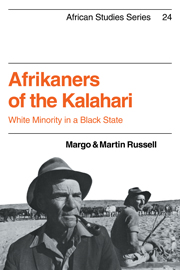Book contents
- Frontmatter
- Contents
- List of illustrations
- Acknowledgements
- A note on terminology
- 1 Southern Africa
- 1 The mundane Kalahari: an introduction
- 2 Boers, trekboers and bywoners: 1898–1930
- 3 Into the cash economy: 1930–72
- 4 Ghanzi Afrikaners 1973: a domestic description
- 5 Preserving boundaries: similarities, ambiguities and avoidances
- 6 Boers and Bushmen: dependence, interdependence and Independence
- 7 Sharing religion: attitudes to the conversion of the Bushmen to Christianity
- 8 Boers, bureaucrats and blacks
- 9 Prospect: whites in a black state
- Notes
- Bibliography
- Index
1 - The mundane Kalahari: an introduction
Published online by Cambridge University Press: 04 August 2010
- Frontmatter
- Contents
- List of illustrations
- Acknowledgements
- A note on terminology
- 1 Southern Africa
- 1 The mundane Kalahari: an introduction
- 2 Boers, trekboers and bywoners: 1898–1930
- 3 Into the cash economy: 1930–72
- 4 Ghanzi Afrikaners 1973: a domestic description
- 5 Preserving boundaries: similarities, ambiguities and avoidances
- 6 Boers and Bushmen: dependence, interdependence and Independence
- 7 Sharing religion: attitudes to the conversion of the Bushmen to Christianity
- 8 Boers, bureaucrats and blacks
- 9 Prospect: whites in a black state
- Notes
- Bibliography
- Index
Summary
In the public imagination the Kalahari is associated with Bushmen, and rightly so, since not only are they its majority group, but it is the only place where their hunting and gathering life style survives. It is the Bushmen who draw anthropologists and linguists by the score into the Kalahari. This book, however, is about another Kalahari people, white Afrikaans-speaking cattle pastoralists who for three generations have occupied the limestone ridge in the western Kalahari that stretches from Gobabis in Namibia to the Kwebe Hills below Lake Ngami in Botswana.
Although these Afrikaners feature in the anthropological texts, they tend to be confined to the small type of footnotes or acknowledgements, shadowy subsidiaries, supplying petrol, acting as guides, interpreters and drivers, cited by name and occupation rather than collectively, since they spoil the stereotype of Afrikaners as the Bushman enemy and exploiter. Perhaps they spoil the anthropological idyll. The anthropologists like to reserve to themselves the monopoly of intimacy with this anachronistic stone-age culture. The reality of the Kalahari is less romantic but in many ways more interesting.
Besides the Bushmen and the Afrikaners there are the various pastoral people who have been attracted to the remote empty grasslands: Coloured settlers from the northern Cape, Kgalagari from the south and west, Herero fleeing east from German rule in Namibia, and Barolong moving westwards to escape British colonial taxation.
- Type
- Chapter
- Information
- Afrikaners of the KalahariWhite Minority in a Black State, pp. 1 - 9Publisher: Cambridge University PressPrint publication year: 1979



